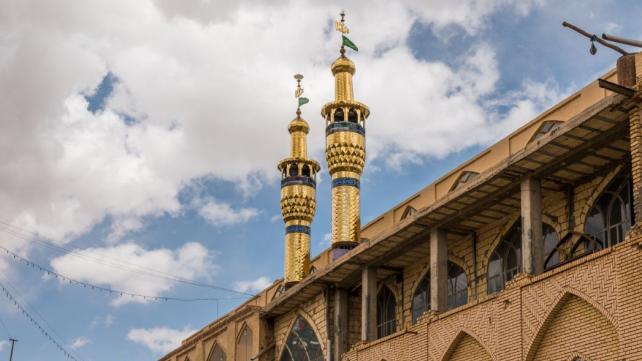
Ashura, the 10th day of Muharram is observed differently by Muslims depending upon which branch of Islam one follows. For Shia Muslims, Ashura is mainly a day of mourning and remembrance of the martyrdom of Imam Hussain and his family and companions at the Battle of Karbala. Imam Hussain was the son of Fatima (RA) and Ali (RA) and the grandson of the Prophet Muhammad (SAW) and the Battle of Karbala was a pivotal moment propelling the development of the Shia branch of Islam with its own religious rituals and history. For Sunni Muslims Ashura is observed with fasting based on the words and practices of the Prophet Muhammad (SAW) who recognized this day as a commemoration of Allah saving Prophet Musa (AS) and his people from Pharaoh.
In the United States, family members, especially through marriage or travel, may adhere to both branches of Islam or may be of a same branch of Islam but follow different madhabs. The nature of American society with Muslims as minorities within it can sometime bring together people in marriage who may not have ever done so if they remained in predominately Muslim populated areas. Also, people who embrace Islam tend to gravitate to the Islamic jurisprudence that provides interpretation of Islamic law developed from the Quran and Sunnah that helps them understand how they wish to practice the religion. In some instances, second generation immigrant Muslims may embrace a different madhab than their parents or grandparents.
This diversity within a Muslim family is manageable if the family members maintain the Islamic adab of respect and tolerance.
Respect family
- Muslims of all branches and madhabs are ordered by Allah in the Holy Quran to respect and honor our family.
O humanity! Be mindful of your Lord Who created you from a single soul, and from it He created its mate,1 and through both He spread countless men and women. And be mindful of Allah—in Whose Name you appeal to one another—and ˹honor˺ family ties. Surely Allah is ever Watchful over you.
Surah Al -Nisa 4:1
Some translations of this verse translate ‘family ties’ as wombs that bore you – both translations indicate blood relatives and the commandments to respect our relatives. This guides families in their behavior with each other as the verse sets out the limits Muslims should observe with each other.
- When families come together, respect that each is Muslim and part of our ibadah is to hold tightly to Allah, His guidance and ordainments as we understand them. We all may be Muslim, but we do not all think the same, and this is how Allah has fashioned the human being. Allah has chosen and makes Muslims.
And strive for Allah with the striving due to Him. He has chosen you and has not placed upon you in the religion any difficulty. [It is] the religion of your father, Abraham. Allah named you “Muslims” before [in former scriptures] and in this [revelation] that the Messenger may be a witness over you and you may be witnesses over the people. So establish prayer and give zakah and hold fast to Allah. He is your protector; and excellent is the protector, and excellent is the helper.
Surah Al Hajj 22:78
- Also, when families come together with differing opinions of Islamic jurisprudence, the peace can be maintained by focusing on shared values consistent with all Muslims like kindness, taking care of orphans, giving freely of our wealth, cooperating with each other, being fair and just, refraining from anger, refraining from backbiting and slander, fulfilling promises, and doing good deeds
Tolerance within families
- Tolerance comes from an Arabic word meaning to bear, indulge, leniency and even forgiveness. In the Quran, Allah commands that we understand that faith is indeed a matter of personal conviction not coercion. Even though we may often only think of this as an interfaith issue, Muslim families should reflect on the verse below as well.
There is no compulsion in [acceptance of] the religion. The right course has become clear from the wrong. So whoever disbelieves in Taghut and believes in Allah has grasped the most trustworthy handhold with no break in it. And Allah is Hearing and Knowing.
Surah Al Baqarah 2:256
- Muslim families must remember that justice and kindness in Islam refers to those who we dislike as well as those to whom we may disagree with.
"O you who have believed, be persistently standing firm for Allah, witnesses in justice, and do not let the hatred of a people prevent you from being just. Be just; that is nearer to righteousness. And fear Allah; indeed, Allah is Acquainted with what you do."
Surah Al Ma’idah 5:8
- There are many verses of the Quran that teach the importance of understanding and adhering to boundaries. These boundaries may relate to family matters, social interactions with Muslims and non-Muslims and religious adherences. Families must be ever conscious not to allow their differences to be exploited by shaitan to cause harsh feelings and separation. Instead, when Muslim families come together, they should go out of their way to have the best adab and enjoy the kindest, politest and most encouraging conversations with each other. Make du’a with and for each other.
And tell My servants to say that which is best. Indeed, Satan induces [dissension] among them. Indeed Satan is ever, to mankind, a clear enemy.
Surah Al-Isra:17: 53
Author bio: Mahasin D. Shamsid-Deen is the news curator and content manager for Muslim Network TV (MNTV) and contributing writer for Sound Vision. She holds a Master’s degree in English Writing and has worked as both a High School and College ESL Instructor and Writing Instructor for more than a decade. Mahasin has numerous published articles, books, essays and is a published playwright with three award winning stage plays. She is currently writing her dissertation for her doctoral degree.



Add new comment